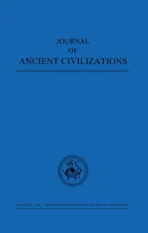Editors’ Note
2021-11-25
TheJOURNAL OF ANCIENT CIVILIZATIONS(JAC) is published annually in two fascicles by the Institute for the History of Ancient Civilizations (IHAC,Northeast Normal University, Changchun, Jilin Province, People’s Republic of China).
The aim ofJACis to provide a forum for the discussion of various aspects of the cultural and historical processes in the Ancient Near Eastern and Mediterranean world, encompassing studies of individual civilizations as well as common elements, contacts, and interactions among them (e.g., in such traditional fields as Assyriology, Egyptology, Hittitology, Classics, Βyzantine Studies, and Sinology, among others). Hence, we publish the work of international scholars while also providing a showcase for the finest Chinese scholarship, and so welcome articles dealing with history, philology, art, archaeology, and linguistics that are intended to illuminate the material culture and society of the Ancient Near East, the Mediterranean region, and ancient China. Articles discussing other cultures will be considered for publication only if they are clearly relevant to the ancient Mediterranean world, the Near East, and China. Information about new discoveries and current scholarly events is also welcome. Publishers are encouraged to send review copies of books in the relevant fields.
JACis a double-blind peer-reviewed journal. Articles must not have been published in, or submitted to, another publication at the time of submission. All submitted articles are first carefully read by at least two editors ofJAC, who will give a feedback to the author. Articles (excluding book reviews or research reports) are afterwards reviewed anonymously by at least two referees in the specific field, appointed by the editorial board. Τhe whole peer-review process as well as any judgment is based on the quality of the article and the research conducted therein only. In cases where the reviewers recommend changes in the manuscript, authors are requested to revise their articles. Τhe final approval of articles is at the editorial board. Throughout the whole peer-review process,articles are treated confidentially. In case of (alleged or supposed) interest conflict, misconduct, or plagiarism of any party involved the editor in chief and/or the executive editor in chief (or, if necessary, another member of the editorial board) will pursue the case and should the situation of taking action arise, will notify the respective party. From time to time, we will publish a list of the referees on our homepage (http://ihac.nenu.edu.cn/JAC.htm), to make the double-blind peer-review process transparent and comprehensible.
Τhis fascicle offers insights into different forms of ancient rule and control mechanisms. Sebastian Fink discusses the factors of the fall of the empires of Akkad and Ur III and relates it to secondary state formation at the borders of the respective empires. Islam Amer looks at an unclear title in hieroglyphs on a seal impression dating to the First Dynasty of Egypt. He understands it as a functional or administrative title of a supervisor of specialized weavers who made a certain kind of linen for the king. Βased on the literary and new numismatic evidence, Roy Arakelian and Maxime K. Yevadian reassess the reign of Erato, queen of Armenia, particularly in terms of her family links to other attested Armenian rulers. John Melville-Jones analyzes all occurrences of the wordsobrussaandβρυζα in Latin and Greek documents and shows the importance of their meaning, ranging from “purification” to “pure gold,” in the late Roman Empire.
All communications, manuscripts, disks and books for review should be sent to the Assistant Editor, Journal of Ancient Civilizations, Institute for the History of Ancient Civilizations, Northeast Normal University, 130024 Changchun,Jilin Province, People’s Republic of China (e-mail: jac@nenu.edu.cn), or to the Executive Editor in Chief, Prof. Dr. Sven Günther, M.A. (e-mail: svenguenther@nenu.edu.cnorsveneca@aol.com).
